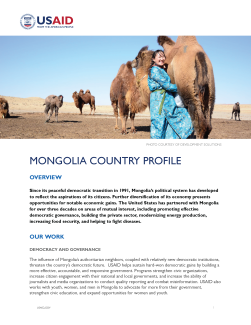Since its peaceful democratic transition in 1991, Mongolia’s political system has developed to reflect the aspirations of its citizens. Further diversification of its economy presents opportunities for notable economic gains. The United States has partnered with Mongolia for over three decades on areas of mutual interest, including promoting effective democratic governance, building the private sector, modernizing energy production, increasing food security, and helping to fight diseases.
DEMOCRACY AND GOVERNANCE
The influence of Mongolia’s authoritarian neighbors, coupled with relatively new democratic institutions, threaten the country’s democratic future. USAID helps sustain hard-won democratic gains by building a more effective, accountable, and responsive government. Programs strengthen civic organizations, increase citizen engagement with their national and local governments, and increase the ability of journalists and media organizations to conduct quality reporting and combat misinformation. USAID also works with youth, women, and men in Mongolia to advocate for more from their government, strengthen civic education, and expand opportunities for women and youth.
ECONOMIC GROWTH
USAID is helping thousands of Mongolia’s small and medium-sized entrepreneurs access credit, facilitate linkages between financial institutions and borrowers, and multiply their investments. This support is advancing diversification of the economy and making growth more inclusive and sustainable in Mongolia, where dependence on extractive industries and underdeveloped manufacturing and services sectors have made the economy vulnerable to global price fluctuations. USAID’s assistance is helping small and medium enterprises to grow and create thousands of new jobs.
CLEAN ENERGY AND ENVIRONMENT
Mongolia’s power sector faces numerous generation, transmission, and distribution challenges. Antiquated infrastructure, an unsustainable system of subsidies, and the dominance of coal all contribute to an inefficient and unreliable system. The dominance of coal-fired generation also contributes to Ulaanbaatar having among the worst air quality in the world. USAID promotes reform initiatives across the energy sector to improve planning and operational performance of electricity and heating systems, increase market competitiveness in the power sector (particularly to encourage more private investment in renewable energy), and enable the adoption of modern energy technologies.
USAID is protecting Mongolian wildlife and natural resources from the impacts of road and railway construction by enhancing the development of effective, high-quality linear infrastructure safeguards that protect people and nature from harm. USAID will also integrate, digitize, and map biodiversity data for current and planned infrastructure projects and create a database of barriers to wildlife migration.
HUMANITARIAN ASSISTANCE
Mongolia is at risk from a wide range of hazards including earthquakes, floods, droughts, forest fires and dzuds—extreme cold weather events—which can lead to large-scale livestock deaths. These hazards are exacerbated by the significant impacts of climate change. USAID supports partnerships and programs that focus on disaster preparedness and resilience in urban and rural contexts, increasing the capacity of local communities and government to prepare for, mitigate, and respond to natural hazards.


